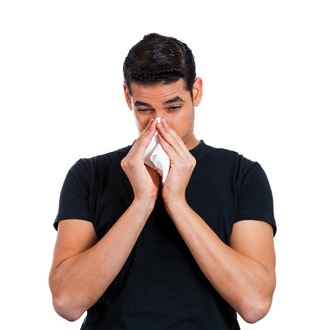
If you dread allergy season, then you know what it’s like to suffer from itchy skin, red eyes, a runny nose, sneezing, sinus pressure, and headaches.
Likewise, you may react to certain foods with hives, headaches, nasal congestion, skin problems, a racing heart, or irritability.
What is the common denominator in both scenarios? Histamines.
While many people just give up and suffer, some natural compounds can bring relief. To understand why these natural remedies work, it’s helpful to understand a bit about histamines.
What are histamines?
Histamine is a protein that causes inflammation, redness, and irritation. It is produced in response to environmental or dietary proteins, also known as antigens.
When the antigen comes into contact with the body, the immune system registers it as an intruder and produces antibodies to it. These antibodies cause a release of histamine into your bloodstream, where they can build up with repeated exposure and increase sensitivity.
Histamines are found in many common foods, especially those aged or fermented, such as aged cheese, red wine, and sauerkraut, and also in foods such as eggs, some fruits and vegetables, and some seasonings.
The bright side is that there are a number of natural ways to ease your suffering, whether it’s from seasonal allergies or high-histamine foods.
First – Lower overall inflammation in the body
Before looking at natural antihistamines, it’s important to first address a functional medicine foundation: adopting a diet and lifestyle to lower overall inflammation.
This includes removing foods to which are intolerant (gluten and dairy are most common), stabilizing blood sugar, repairing intestinal permeability, managing low thyroid function and hormone imbalances, and addressing chronic stressors, such as sleep deprivation, over training, toxic exposures, junk food, excess alcohol, and many more.
Quercetin: nature’s Benadryl with Hashimoto’s
Quercetin is a bioflavonoid with anti-oxidant, anti-inflammatory and antihistamine properties.
It also gives both short-term relief and long-term gut repair so you’re you less susceptible to allergies.
Nettles
Nettle leaf is a natural antihistamine that naturally blocks histamine production. It can be made in to a tincture or tea, but for allergy relief, capsules made from dried nettle leaves are the most effective option.
Butterbur
The European herb butterbur has been shown to rival leading OTC drugs in reducing histamine reactions. It’s an anti-inflammatory properties also reduces spasms in smooth muscle and relaxes swollen nasal membranes.
Mangosteen
Mangosteen is a fruit extract that has been shown to reduce inflammation and inhibit histamine release.
Ginger
This Asian medicinal plant has been shown to inhibit histamine production.
Ask me about natural antihistamine relief
These are just a few of the many compounds effective in reducing histamine reactions. You can benefit from the synergistic effect of these compounds working together in product formulations that combine them.
If you have seasonal allergies or react to foods, contact my office. I can help you determine the source of your symptoms and get you on the path to feeling better.



Latest from the Blog
Autoimmune Disease Management with EBOO Therapy
July 17, 2024Autoimmune diseases, characterized by the immune system attacking the body’s own tissues, present significant challenges in treatment and management. Extracorporeal Blood Oxygenation and Ozonation (EBOO) therapy offers a promising adjunctive approach to managing autoimmune conditions. Functioning similarly to a dialysis machine, EBOO filters the blood to remove toxins and pathogens that may trigger autoimmune responses. […] Read more
Latest from the Blog
Detoxification and EBOO Therapy: Optimizing Cellular Health
Detoxification plays a crucial role in maintaining optimal health in today’s toxin-laden environment. Extracorporeal Blood Oxygenation and Ozonation (EBOO) therapy offers a sophisticated approach to detoxifying the bloodstream and enhancing overall well-being. Operating similarly to a blood filtration system, EBOO effectively removes toxins, pesticides, and chemicals that accumulate in the body, supporting the body’s natural […] Read more